Endocrine System
The endocrine system is a complex network of glands and organs that produce and release hormones to regulate numerous bodily functions. These hormones act as chemical messengers, traveling through the bloodstream to target cells and organs, where they help to control growth, development, metabolism, and reproduction.
Key Components of the Endocrine System
- Glands: The endocrine system includes several glands such as the pituitary, thyroid, adrenal, pancreas, and ovaries/testes. These glands secrete hormones directly into the bloodstream.
- Hormones: Hormones are the signaling molecules produced by the endocrine glands. Each hormone has a specific function and target organ.
- Target Organs: These are organs or tissues that have specific receptors for a particular hormone and are affected by that hormone.
Major Endocrine Glands and their Functions
| Gland | Location | Primary Hormones Produced | Functions |
|---|---|---|---|
| Pituitary | Base of the brain | Growth hormone (GH), Thyroid-stimulating hormone (TSH), etc. | Regulation of growth, metabolism, and other endocrine glands. |
| Thyroid | Neck | Thyroxine (T4), Triiodothyronine (T3) | Regulation of metabolism, growth, and development. |
| Adrenal | Above the kidneys | Cortisol, Epinephrine, Aldosterone | Regulation of stress response, blood pressure, and electrolyte balance. |
| Pancreas | Abdomen | Insulin, Glucagon | Regulation of blood sugar levels. |
| Ovaries (in females) / Testes (in males) | Lower abdomen (ovaries), Scrotum (testes) | Estrogen, Progesterone (ovaries) / Testosterone (testes) | Regulation of reproductive functions and secondary sexual characteristics. |
Disorders of the Endocrine System
Disruptions in the production or function of hormones can lead to various endocrine disorders, including diabetes, thyroid disorders, adrenal insufficiency, and reproductive hormone imbalances.
Study Tips
- Understand the function of each major endocrine gland and the hormones they produce.
- Learn about the negative feedback mechanism that regulates hormone secretion.
- Study the roles of hormones in regulating metabolism, growth, and homeostasis.
- Practice identifying the target organs of specific hormones and their physiological effects.
- Review common endocrine disorders and their symptoms.
Remember to review and consolidate your knowledge with practice quizzes and diagrams of hormone pathways. Good luck studying!
[Endocrine System] Related Worksheets and Study Guides:
.◂Biology Worksheets and Study Guides High School. Invertebrates
Worksheet/Answer key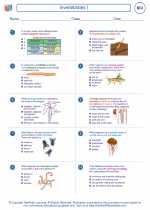 Invertebrates I
Invertebrates I  Worksheet/Answer key
Worksheet/Answer key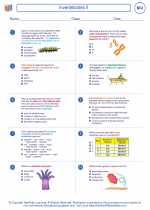 Invertebrates II
Invertebrates II  Worksheet/Answer key
Worksheet/Answer key Invertebrates I
Invertebrates I  Worksheet/Answer key
Worksheet/Answer key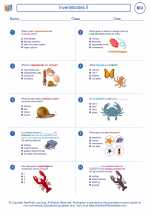 Invertebrates II
Invertebrates II  Worksheet/Answer key
Worksheet/Answer key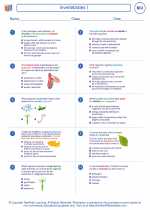 Invertebrates I
Invertebrates I  Worksheet/Answer key
Worksheet/Answer key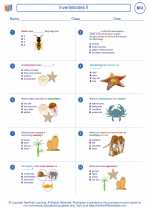 Invertebrates II
Invertebrates II  Vocabulary/Answer key
Vocabulary/Answer key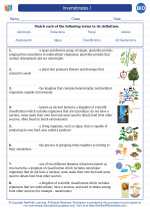 Invertebrates I
Invertebrates I  Vocabulary/Answer key
Vocabulary/Answer key Invertebrates I
Invertebrates I  Vocabulary/Answer key
Vocabulary/Answer key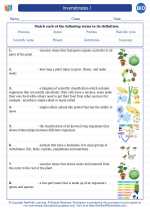 Invertebrates I
Invertebrates I 

 Worksheet/Answer key
Worksheet/Answer key
 Worksheet/Answer key
Worksheet/Answer key
 Worksheet/Answer key
Worksheet/Answer key
 Worksheet/Answer key
Worksheet/Answer key
 Worksheet/Answer key
Worksheet/Answer key
 Vocabulary/Answer key
Vocabulary/Answer key
 Vocabulary/Answer key
Vocabulary/Answer key
 Vocabulary/Answer key
Vocabulary/Answer key

The resources above cover the following skills:
Concepts of Life Science (SC1, SC2, SC3)
The student demonstrates an understanding of the structure, function, behavior, development, life cycles, and diversity of living organisms by describing the structure-function relationship